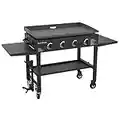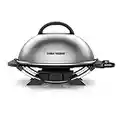When the long Canadian winter finally gives way to warm summer days, and the aroma of blooming flowers fills our backyards, there's one thing on our minds - it's time for summer barbecues, eh? But before we can savour those perfectly charred steaks and smoky veggies, we need the ideal grill. Picking the right grill can transform a simple backyard cookout into an extraordinary culinary event.
This all-inclusive guide will walk you through everything you need to know to find the best grill for your summer barbecues. We'll explore various types of grills, key elements to consider, safety pointers, budget aspects, and even provide you with our top grill suggestions. Ready, friends? Let's dive right in!
Assessing Your Barbecuing Needs
Before you can start shopping for a grill, it's crucial to assess your unique barbecuing needs. Grills come in an array of sizes and designs, and the optimal one for you will depend on a variety of factors. Here are some key considerations to think about.
Barbecuing Styles
Are you a fan of the smoky flavour of slow-cooked ribs, or do you favour the quick, high-heat searing for steaks and burgers? Your preferred cooking style is a significant factor in picking the right grill. Charcoal grills, for example, are famous for their smoke-infused flavour, while gas grills provide quick heat-up times and easy temperature control.
Number of People to Serve
Are you generally cooking for a small family gathering or hosting large backyard parties? The size of your grill should correspond to the number of people you typically serve. A compact, portable grill might be perfect for intimate family dinners, while a larger grill with multiple burners will cater better to a crowd.
Barbecuing Frequency
The frequency with which you plan to use your grill also influences your choice. If you're an occasional griller, a straightforward, low-maintenance option might be just right. However, if you're firing up the grill multiple times a week, investing in a robust grill with longevity and a variety of features could be well worth it.
Different Types of Grills
Now that you've considered your barbecuing needs, let's explore the different types of grills on the market. Each has its unique benefits and drawbacks.
Charcoal Grills
Charcoal grills are classic favourites. They use charcoal briquettes as fuel, which, when heated, impart a distinctive smoky flavour that's challenging to mimic.
The main advantage of charcoal grills is the flavour they provide. They're also typically more affordable upfront than their gas counterparts. However, they take longer to heat up, require more cleanup, and the cost of charcoal can accumulate over time.
Gas Grills
Gas grills are incredibly popular due to their convenience. They can use either natural gas from a utility line or propane from a refillable tank. With a simple twist of a knob, you can control the heat level, making them ideal for a variety of cooking techniques.
Gas grills heat up quickly, require less cleanup than charcoal grills, and the fuel cost is generally lower. However, they're usually more expensive initially, and some purists argue they don't offer the same depth of flavour as charcoal grills.
Electric Grills
Electric grills are a handy choice for those who have limited outdoor space or restrictions on open flames. All they need is an electrical outlet, and they're ready to go.
These grills are user-friendly, require minimal cleanup, and eliminate the need for fuel. However, they typically don't reach as high temperatures as gas or charcoal grills,and they won't provide a smoky flavour.
Portable Grills
Portable grills, as you might guess, are designed for on-the-move cooking. They're perfect for camping trips, picnics, or tailgate parties. They can use either charcoal or propane as fuel.
Portable grills are compact, budget-friendly, and handy for travelling grilling. However, their small size means they might not be suitable for large gatherings, and they typically lack the advanced features of larger grills.
Smoker Grills
Smoker grills are for the barbecuing enthusiasts who love the process as much as the end result. They use wood or charcoal for fuel and are designed for low and slow cooking, which imparts a deep, smoky flavour.
Smoker grills can produce incredibly flavourful and tender results. However, they require more time, patience, and skill than other grills. They're also generally more expensive.
Crucial Features to Consider
Once you've decided on the type of grill that suits your needs, it's time to consider the features. These can greatly enhance your grilling experience.
Grill Size and Cooking Space
The size of the grill and its cooking space should match the quantity of food you plan to cook regularly. If you often cook for large groups, you'll need a grill with a larger cooking surface. Also, consider if you need additional warming racks or side burners for versatility.
Grill Materials and Longevity
Grills can be made from a variety of materials, including cast iron, stainless steel, and enameled steel or cast iron. Each material has its pros and cons in terms of longevity, heat retention, and maintenance. Consider your climate and how your grill will be stored when deciding on the best materials.
Heat Control and Temperature Range
The ability to control the heat of your grill is crucial. Look for grills with adjustable heat controls and a wide temperature range. This allows you to sear steaks at high heat or slow-cook ribs at a lower temperature.
Additional Features
Additional features like side burners, storage cabinets, prep areas, and included grilling tools can enhance your grilling experience. However, they also tend to increase the price, so consider what features you'll realistically use.
Grill Safety
No discussion about grilling would be complete without a word on safety. Regardless of the type of grill you choose, it's crucial to operate it safely to prevent accidents and ensure a fun and enjoyable grilling experience.
Safe Operation
Always follow the manufacturer's instructions for setting up, using, and cleaning your grill. Never leave a lit grill unattended, and keep children and pets at a safe distance. It's also a good idea to have a fire extinguisher nearby when grilling.
Proper Maintenance
Regular maintenance of your grill is not only important for its longevity but also for safety. Check for any leaks, cracks, or other damage before using your grill, especially if it's been stored for a while. Clean your grill regularly to prevent grease buildup, which can cause flare-ups.
Budget Considerations
Grills can range dramatically in price, from budget-friendly options to high-end models. It's important to consider not only the upfront cost but also the ongoing costs of fuel and maintenance.
While it might be tempting to go for the cheapest option, it's often worth investing a bit more for a grill that will last longer and perform better. Conversely, don't assume that the most expensive grill is the best one for you. Consider your specific needs and budget to find the best value.
Conclusion
Choosing the right grill can make all the difference in your summer barbecues. By considering your grilling needs, understanding the different types of grills, and weighing the importance of various features, you can find the perfect grill for you. Remember, the best grill isn't necessarily the most expensive one—it's the one that suits your needs and budget.
We hope this guide has been helpful in your grill-buying journey. Now, all that's left is to fire up your new grill and enjoy the mouthwatering results. Happy grilling, eh!



